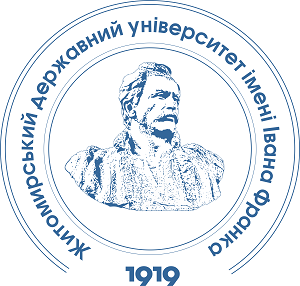THE AGE DIFFERENCES IN VERBAL DYNAMIC OF THIN KING
DOI:
https://doi.org/10.32782/psy-2024-4-2Keywords:
thinking, cognitive development, verbal dynamics, verbal activity, age differences.Abstract
Abstract. The peculiarities of age differences in verbal dynamics are analyzed in this article. The verbal productivity of thinking is objectified during cognitive task in number of used words. The differences of statistical significance among four different age groups (n=120) are not observed (р>0,05) in current research. This partly contradicts some published studies according to which decrease of verbal activity happens with age. We tend to explain such a discrepancy in the results by the fact that during the study, cognitive activity was relatively short (25-50 minutes), and the proposed task did not involve significant cognitive complexity (the task was creative in nature, without an ideal or correct standard for completion). The methodology of study was as follows: participants needed to formulate 15 sentences in story with missing parts. All paried sentences are missed in the task. The study established that intragroup increase of verbal indicators was insignificant. This tendency is noted in every age group, except the elderly. This group shoved the equality of verbal productivity. At the same time, we established the insignificant downward trend of verbal dynamics according to age criteria, except elderly persons. The persons of youthful age have the lowest stability of verbal activity. At the same time, the youth showed the highest indicators of verbal productivity on every stage of study. We suggest that it is connected to the comparatively higher plasticity of their verbal abilities. The middle-aged group demonstrates the most stable indicators of verbal dynamics. For the elderly, the data shows consistency but with greater within-group variability in indicators compared to the middle-aged group.
References
Мазяр О. «Методика текстуальних розривів» як метод вивчення процесуальних характеристик мислення. Функціонування творчого мислення в умовах інформаційної невизначеності : матеріали ХХІІІ Всеукраїнської науково-практичної конференції, м. Київ, 30 травня 2023 року / за ред. В. О. Моляко. Київ : Інститут психології імені Г. С. Костюка НАПН України, 2023. С. 67–69.
Мазяр О. Зв’язок мислення та академічної успішності. Актуальні питання розвитку особистості: сучасність, інновації, перспективи : збірник наукових праць за матеріалами Міжнародної науково-практичної інтернет-конференції, м. Житомир, 25 квітня 2023 р. / ред. колегія: Л. Котлова, С. Дмитрієва, С. Максимець. Житомир : Вид-во ЖДУ імені Івана Франка, 2023. С. 198–199.
Alwin D. F., McCammon R. J. Aging, Cohorts, and Verbal Ability. The Journals of Gerontology: Series B. 2001. Vol. 56, № 3. Р. 151–161.
Arbuckle T. Y., Gold D. P. Aging, inhibition, and verbosity. Journals of Gerontology. 1993.Vol. 48, № 5. P. 225–232. https://doi: 10.1093/geronj/48.5.p225.
Burke D. M., Shafto M. A. Aging and Language Production. Current Directions in Psychological Science. 2004. Vol. 13, № 1. Р. 21–24. https://doi: 10.1111/j.0963-7214.2004.01301006.x.
Cerella J. Information processing rates in the elderly. Psychological Bulletin. 1985. Vol. 98, № (1). Р. 67–83. https://doi.org/10.1037/0033-2909.98.1.67.
Gerard L., Zacks R. T., Hasher L., Radvansky G. A. Age deficits in retrieval: The fan effect. Journal of Gerontology. 1991. Vol. 46, № 4. P. 131–136. https://doi.org/10.1093/geronj/46.4.P131.
Jensen A. R. The g factor: The science of mental ability. London : Praeger Publishers/Greenwood Publishing Group, 1998. 660 р.
Kemper S., Sumner A. The structure of verbal abilities in young and older adults. Psychology and Aging. 2001. Vol. 16, № 2. Р. 312–322.
Lindenberger U., Mayr U., Kliegl R. Speed and intelligence in old age. Psychology and Aging. 1993. Vol. 8, № 2. Р. 207–220. https://doi.org/10.1037/0882-7974.8.2.207.
Ramscar M., Hendrix P., Shaoul C., Milin P., Baayen H. The myth of cognitive decline: Non-linear dynamics of lifelong learning. Topics in Cognitive Science. 2014. Vol. 6, № 1. Р. 5–42.
Salthouse T. A. The processing-speed theory of adult age differences in cognition. Psychological Review. 1996. Vol. 103, № 3. Р. 403–428. https://doi.org/10.1037/0033-295X.103.3.403.
Süß H.-M., Oberauer K., Wittmann W. W., Wilhelm O., Schulze R. Working-memory capacity explains reasoning ability and a little bit more. Intelligence. 2002. Vol. 30, № 3. Р. 261–288. https://doi.org/10.1016/S0160-2896(01)00100-3.
Verhaeghen P., Cerella J. Aging, executive control, and attention: a review of meta-analyses. Neuroscience & Biobehavioral Reviews. 2002. Vol. 26, № 7. Р. 849–857. https://doi: 10.1016/s0149-7634(02)00071-4.






